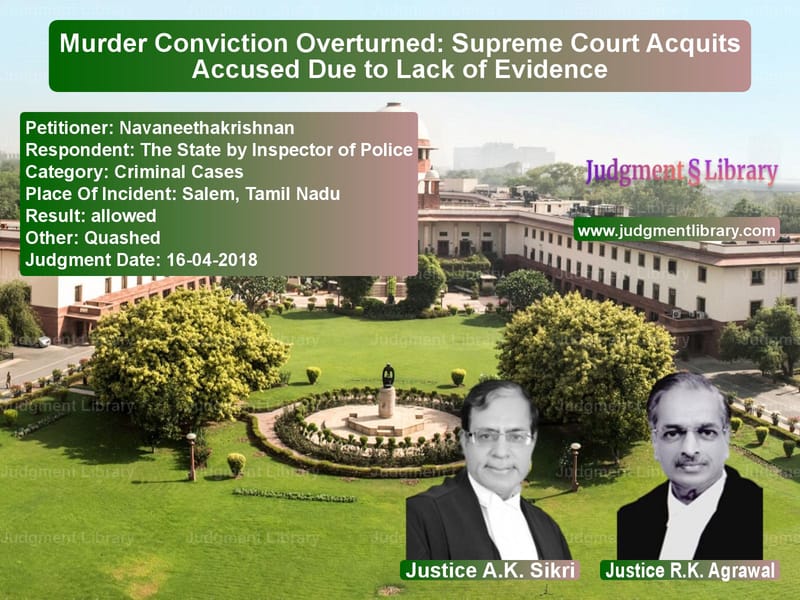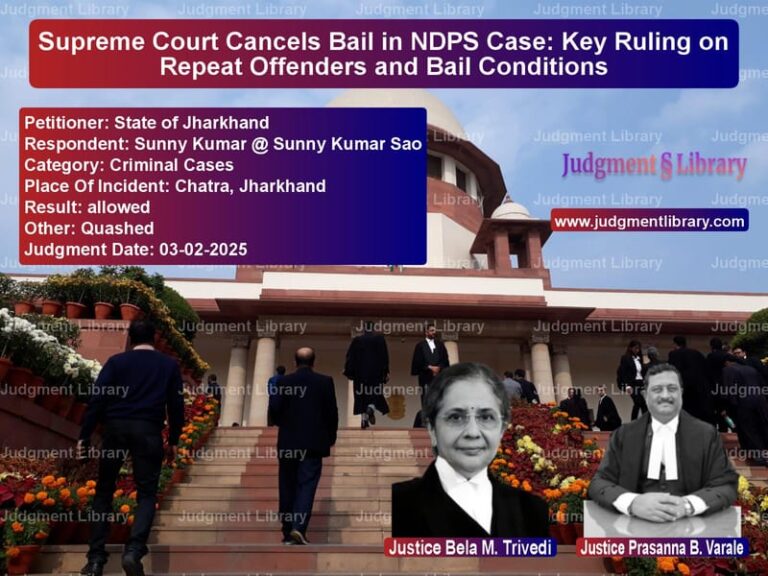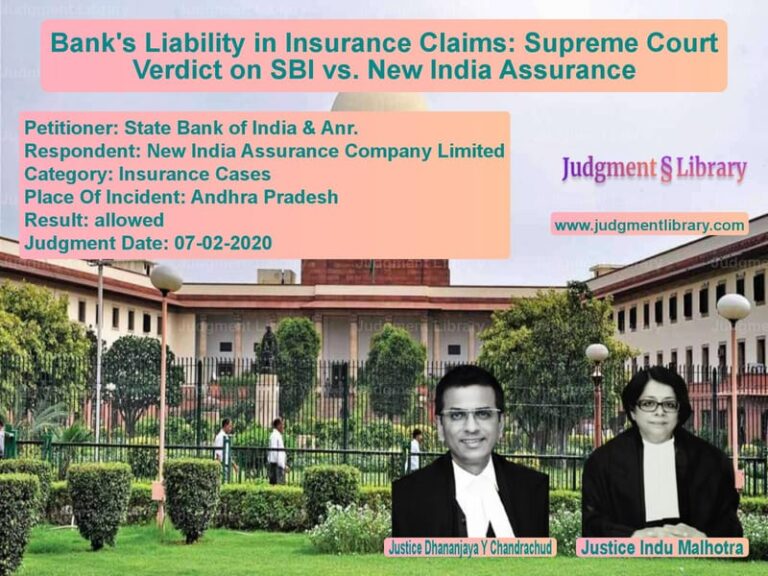Murder Conviction Overturned: Supreme Court Acquits Accused Due to Lack of Evidence
The Supreme Court of India, in the case of Navaneethakrishnan v. The State by Inspector of Police, overturned the conviction of the appellant, who had been sentenced to life imprisonment for murder. The Court found that the prosecution had failed to establish a complete chain of circumstantial evidence, and the confession made by the accused while in custody was inadmissible under Section 26 of the Indian Evidence Act, 1872.
The judgment, delivered by a bench comprising A.K. Sikri and R.K. Agrawal, emphasized the need for reliable evidence and dismissed the conviction due to lack of direct evidence, inconsistent witness testimonies, and procedural lapses.
Background of the Case
The case involved the murder of John Bosco and Madhan, who were last seen with the accused on February 14, 2008. Their bodies were later recovered in gunny bags from different locations. The prosecution alleged that the accused had hired the victims’ taxi under the guise of sightseeing, then strangled them with a rope, and disposed of their bodies.
The trial court convicted the accused under Sections 302, 364, and 379 of the Indian Penal Code (IPC) and sentenced them to life imprisonment. The Madras High Court upheld the conviction. However, the Supreme Court, after reviewing the evidence, found serious shortcomings in the prosecution’s case.
Key Legal Issues
- Whether the conviction could be sustained solely based on circumstantial evidence.
- Whether the alleged confession made by the accused while in custody was admissible under the Indian Evidence Act.
- Whether the prosecution had established a complete chain of circumstances proving the guilt of the accused beyond a reasonable doubt.
Arguments Presented
Appellant’s Arguments
The defense contended:
- The case was based entirely on circumstantial evidence with no direct proof linking the accused to the crime.
- The alleged confession made to the police was inadmissible under Section 26 of the Indian Evidence Act.
- The prosecution failed to produce a complete chain of evidence that excluded all other possibilities.
- The last-seen theory was unreliable because no identification parade was conducted, and the witness identified the accused in court after a significant delay.
Prosecution’s Arguments
The prosecution argued:
- The accused were last seen with the victims on February 14, 2008, which strongly indicated their involvement.
- The confession made by the accused led to the discovery of material objects, which corroborated their involvement.
- The recovered vehicle, mobile phone, and camera belonging to the victims linked the accused to the crime.
- The circumstantial evidence was sufficient to convict the accused beyond a reasonable doubt.
Supreme Court’s Observations
The Supreme Court meticulously analyzed the evidence and found major flaws in the prosecution’s case.
Failure to Establish a Complete Chain of Circumstantial Evidence
The Court reiterated the principles laid down in Padala Veera Reddy v. State of Andhra Pradesh, stating:
“The circumstantial evidence must form a complete chain that leads to only one conclusion—that the accused is guilty. Any missing link creates doubt, which must benefit the accused.”
The Court found that:
- The last-seen theory was unreliable as the witness had no prior acquaintance with the accused.
- The identification of the accused in court, without prior identification in an official parade, was questionable.
- The prosecution failed to prove that the recovered camera and mobile phone belonged to the victims.
- The possibility of another assailant could not be ruled out due to the significant gap between the last sighting and recovery of the bodies.
Confession Inadmissible Under Section 26 of the Indian Evidence Act
The Court ruled that the alleged confession made by the accused while in police custody was inadmissible:
“Section 26 prohibits the use of confessions made in police custody unless they lead to the discovery of new facts. In this case, the confession did not lead to any new discovery, making it inadmissible.”
The Court further stated:
“The prosecution must prove guilt beyond a reasonable doubt, and the accused’s statement cannot be the sole basis for conviction.”
Failure to Prove Ownership of Recovered Objects
The Court also noted that the prosecution failed to prove that the recovered mobile phone and camera belonged to the deceased:
“The prosecution’s claim that the mobile phone belonged to John Bosco was unsupported, as the phone was not purchased in his name.”
Final Judgment
The Supreme Court overturned the conviction, stating:
“The judgment of the High Court is set aside. The prosecution has failed to establish a complete chain of evidence proving the accused’s guilt beyond a reasonable doubt. The appellants are acquitted, and they shall be released forthwith if not required in any other case.”
Implications of the Judgment
- This ruling reinforces the principle that circumstantial evidence must form a complete and unbroken chain to sustain a conviction.
- It upholds the constitutional protection against custodial confessions under Section 26 of the Indian Evidence Act.
- The judgment sets a precedent for ensuring rigorous scrutiny of evidence in criminal trials.
- It safeguards against wrongful convictions based on weak or circumstantial evidence.
This landmark ruling highlights the importance of due process and adherence to legal safeguards in criminal trials, ensuring that no individual is convicted based on inadequate or improperly obtained evidence.
Petitioner Name: Navaneethakrishnan.Respondent Name: The State by Inspector of Police.Judgment By: Justice A.K. Sikri, Justice R.K. Agrawal.Place Of Incident: Salem, Tamil Nadu.Judgment Date: 16-04-2018.
Don’t miss out on the full details! Download the complete judgment in PDF format below and gain valuable insights instantly!
Download Judgment: Navaneethakrishnan vs The State by Inspect Supreme Court of India Judgment Dated 16-04-2018.pdf
Direct Downlaod Judgment: Direct downlaod this Judgment
See all petitions in Murder Cases
See all petitions in Attempt to Murder Cases
See all petitions in Custodial Deaths and Police Misconduct
See all petitions in Judgment by A.K. Sikri
See all petitions in Judgment by R K Agrawal
See all petitions in allowed
See all petitions in Quashed
See all petitions in supreme court of India judgments April 2018
See all petitions in 2018 judgments
See all posts in Criminal Cases Category
See all allowed petitions in Criminal Cases Category
See all Dismissed petitions in Criminal Cases Category
See all partially allowed petitions in Criminal Cases Category







